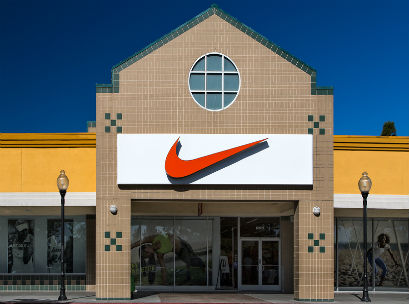 Nike has confirmed it is launching a pilot program to sell sneakers on Amazon, in a move to combat counterfeiters and unsolicited third-party sales conducted online.
Nike has confirmed it is launching a pilot program to sell sneakers on Amazon, in a move to combat counterfeiters and unsolicited third-party sales conducted online.
In a call with analysts last week, Nike CEO Mark Parker said that Amazon would carry “a limited Nike product assortment” of footwear, apparel, and accessories, and that Nike was seeking to improve its presence on the ecommerce site while also protect its brand reputation.
“We’re in the early stages, but we really look forward to evaluating the results of the pilot,” he said. “We are looking to improve the Nike consumer experience on Amazon by elevating the way the brand is presented and increasing the quality of product storytelling.”
The deal follows nearly a decade of meetings between the two companies and although Nike has not officially sold products directly on Amazon until now, it is the most-purchased apparel brand on the site, according to a recent Morgan Stanley survey.
Speaking to Inside Retail Weekly, Nathan Cloutman, senior industry analyst at IBISWorld said though Nike may lose control of how its products are presented – a major sticking point in negotiations between the two giants until now – the benefits would outweigh any loss of creative control.
“The extra sales, in terms of not having products sold through third party and counterfeit products on Amazon, is going to be more beneficial to them in the long run,” he said.
Parker also said the company is exploring changes in how it sells online.
Goldman Sachs analysts in the US expect the move could boost Nike’s wholesale revenue by $300 million to $500 million annually.
Cloutman doesn’t expect the likes of Footlocker or JD Sports in markets where Amazon operates to be significantly impacted, given Nike “still makes over two-thirds of their sales through the wholesale function”.
In its Q4 announcement last week, Nike said sales to wholesale customers increased five per cent, while direct-to-consumer (DTC) revenues grew to $9.1 billion, up 18 per cent, driven by a 30 per cent increase in digital commerce sales, the addition of new stores and seven per cent growth in comparable store sales. As of 31 May 2017, the Nike brand had 985 DTC stores in operation compared with 919 a year ago.
Last month, Nike said it planned to sell more shoes directly to customers online as part of a restructuring in which it plans to cut about 1,400 jobs.
It will also reduce the number of sneaker and clothing styles it makes by a quarter and focus on popular sellers.
Nike said the moves will help it offer more products to customers faster.
“We’re getting even more aggressive in the digital marketplace,” said Parker.
IRW contacted Retail Prodigy Group who operates Nike in ANZ and Super Retail Group which stocks the Nike brand in Rebel and Amart Sports for further comment.





